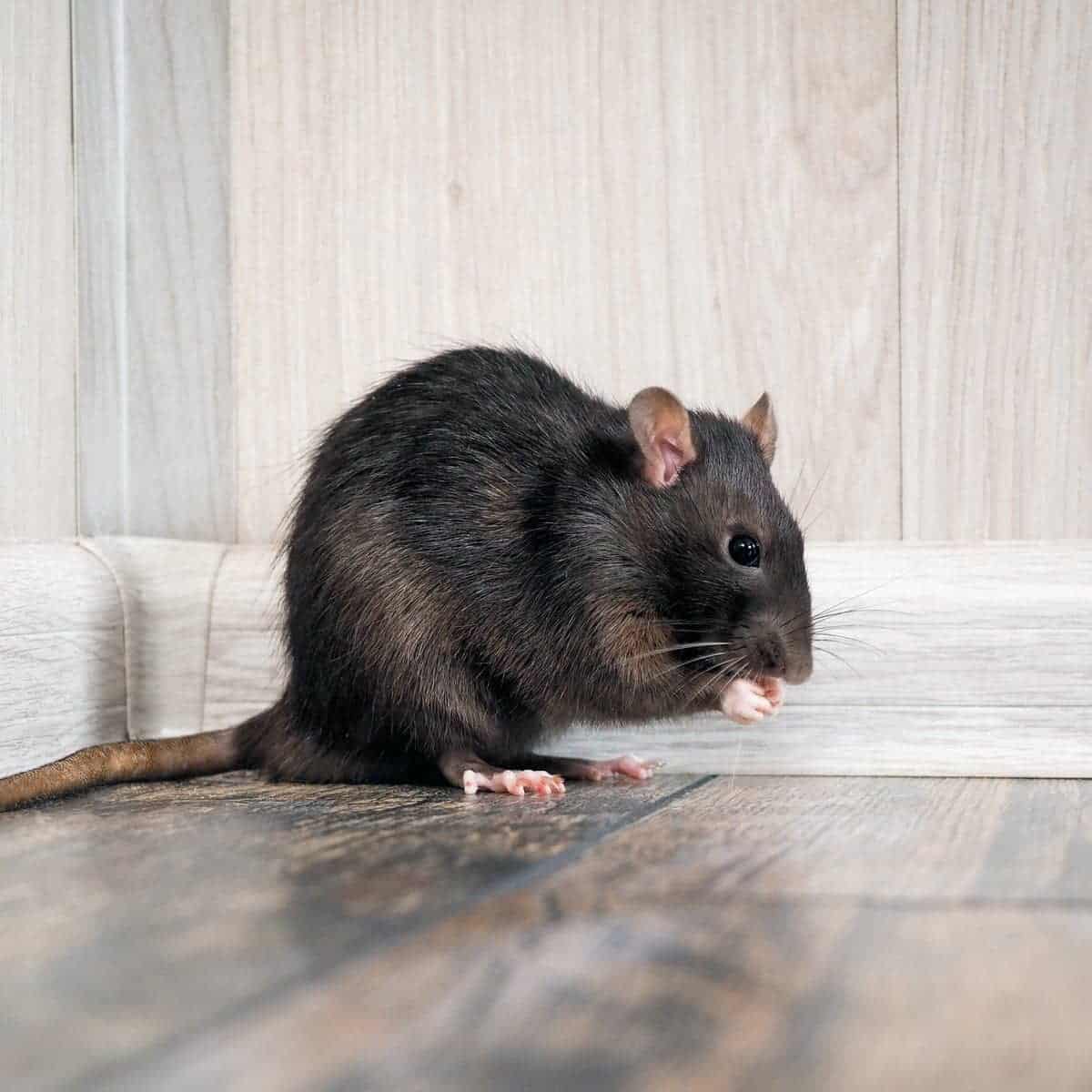In general, rats are very quiet rodents and it’s extremely uncommon that they’re going to make. There are no typical sounds rats make on regular basis like birds or squirrels which is why rats live in your home for long without you coming to know about it. But the only sound which you may hear from rats is squeak, but why do rats squeak? And is it all to rats sound supposed to make? Here are the answers.
The Short Answer…
Rats make a long squeak injured, scared or nervous rats like if rats get a toe caught in the cage or break a toenail. Or When they’re sometimes first handled, or somebody takes a rat out of the home, the rat becomes nervous and makes a high pitched squeaking sound. For example, when they are first picked up, they are sent to the veterinarian so they may vocalize and squeak a little bit.
However, when rats are happy, they will make short consistent squeaks that indicates their satisfaction. And that’s about the most sound they are going to make. But that’s not the only sound they make, rats also make scratching, scurrying, gnawing, chirping and more.
Rats are intelligent. They are as clever as dogs. They mostly communicate with gestures but when they are in threat or under attack, they make a distress call to inform others about the danger. However, they also make sound when they are having fun, but how to identify the difference? Here’s how.
When Do Rats Squeak?
Like squirrels, rats do make sounds in different situations and concerns. If they notice a predator, they will squeak to warn the predator and also inform other rats of the threat. A little bit a warning type of sound that either indicates that something has scared them, something has hurt them or something has injured them and they are alerting you to that.
Most times rats squeak when they are in pain like getting caught in a trap. Other times rats may also squeak when rats are very scared or nervous like when they are first picked up in hand, making a short squeak of vocalization. Most of the time a lot of the cues rats have for each other relate to body language and recognition of certain movements. They don’t tend to have a vocal or spoken language.
Most of the time vocalizations like a short squeak relate to an outcry, a warning or fear type of vocalization.
According to observations in rats in captivity, rats squeaking noise happens through the night. Rats are nocturnal rodents which becomes active during the night. The normal squeaking noise is close to 2Hz.

Is It Normal For Rats to Squeak?
It depends. If a rat makes a short high pitched squeak, it basically means having fun. Other than that, if a rat is making continuous long squeaks, it usually indicates a sign of pain, concern or fear. Sometimes rats squeak to intimidate other rats or before they engage in a fight with one of them.
What Other Sounds Do Rats Make?
Squeaking are not the only sound rats make, here is a shortlist of sounds that rats, like other rodents, could do:
- Scratching
When rats try to climb on other objects, rats may make a scratching sound, not scratching like squirrels do. The noise comes from their hand and leg nails that are fiercely caught on surfaces to give them the right friction to reach their destination.
- Scurrying
It’s an abnormal sound that you may listen to when rats move from one part of your attic to the other. You need to be really careful to distinguish that noise, but it’s happening when they need to migrate in teams.
- Gnawing
This kind of noise comes when a big team of rats starts chewing food or wood chips. Many rats together can intensify the sound, and that’s the only way to realize that gnawing is happening.
- Chirping noises
They come from rats who hit their teeth to show that they are there and ready to eat.
- Bruxing Sound
It’s a common sound that rats make when they smash food with their teeth and it’s pretty frightening to hear.
- Boggling Sound
Boggling sounds are almost the same like the bruxing one but with the difference they are more profound and continuous.
Are Rats Afraid of Any Noises?
While rats are active throughout the night, it is usually quiet and that’s what rats like.
Rats can be afraid of new sounds at first. But if the sound was consistent, rats will adapt and get used to it. Like a rat living in a factory will get used to the sound of machines and everyday sounds.
However, certain sounds are rats afraid of and may scare away rats such as distress call that tells other rats they are under attack and this place is not safe. Playing a rat distress call which is quite harsh audio in rat-infested areas of your home or garden may scare away rats. The audio has been edited to be very awful for a rat to hear which is 20,000hz. It is similar to hearing a person screaming in pain. Its a great way to get rid of rats in a humane way.
Another sound is cat meowing or dog barking will make rat fearful that may lead to rat squeaking. That’s the same for the smell.
What Sound Do Rats Make When They Are Happy or Tickle?
When rats are scared, they make long calls and when they are happy, they make short calls according to National Geographic. For example when they interact with other rats and they are given food similar to human voices go higher when we are excited or having fun.
The sounds are shorter and louder which keeps repeating. Their happy sounds start from as low as 20KHz frequency and can come up to almost 100KHz. That is perfectly in the range of human frequency meaning we can hear that.
There are many sounds which come up between those ranges and most of their sounds, sounds like squeaking but isn’t only squeaking all the time. However, the harshness of the sound depends on the duration and tension rats may experience like when you tickle or feed rats with a treat, rats may make louder or lower sounds.
However, if they are scared or in danger, rats will make a long sound like squeak. Here’s the video for more details.
How to Get Rid of Rats with Sound?
Rats are awful rodents. They spread disease, spoil crops, eat food and destroy items by chewing them. Fortunately, there are many ways to fight back and scare away but when you can clear out rats with no cost and effort and as simple as sound then it makes no sense to choose premium options.
Like many animals, rats depends on their sense of smell and sound. That means sounds make effect and they react to the sound depending on its intensity. Like if they hear an intense distress call which happens when a rat is pain or under attack signals running away. Thanks to Youtube and apps which come up with very intense pitch sound noises that can even kill rats by only hearing those sounds.
But the problem is these sounds may work initially but won’t do the job completely. But don’t worry, there are some other solutions to it.
-
Remove Food Sources & Potential Dens
While there are many repellents and remedies, their effectiveness is yet to be seen. Fortunately, there’s a better and more humane way to control rodents and is actually simpler than you think.
When it comes to rat repellent, the first thing which comes to our mind is sound repellent. It does work and scares away rats intially but rats ae pretty clever and intelligent rodents that adapt very well. Once they hear the sound a few times, they will come to know that it is a trap just like scaring birds with owl statues.
Sound repellents produce a high-frequency noise which is higher than humans frequency that can hear. That is used to scare off rats but unfortunately, it doesn’t work for the reason explained.
The easiest yet most effective way is to remove their food sources. That can be your pet food remaining outside at night, bird feeder, fruits and vegetables, grains and seeds and anything edible. As rats are omnivores, they eat anything they get like squirrels. And more importantly, food waste and garbage bins are great sources of food for rats.
Another solution is to fix and cover all the gaps and holes that may potentially rats nest. That can be indoor and outdoor, kitchen, bathroom, under deck, attic, and even pipes.
I have done most of repellents that claims to work however, this solution did the job. Let me know if you have tried any and which one worked for you.


